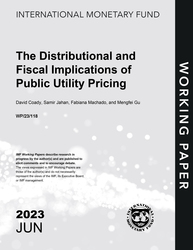
The Distributional and Fiscal Implications of Public Utility Pricing
The Distributional and Fiscal Implications of Public Utility Pricing
READ MORE...
Volume/Issue:
Volume 2023
Issue 118
Publication date: June 2023
ISBN: 9798400243141
$20.00
Add to Cart by clicking price of the language and format you'd like to purchase
Available Languages and Formats
| English |
Prices in red indicate formats that are not yet available but are forthcoming.
Topics covered in this book
This title contains information about the following subjects.
Click on a subject if you would like to see other titles with the same subjects.
Economics- Macroeconomics , Taxation - General , Economics / General , Public utility pricing , efficiency , equity , fiscal sustainability , subsidy reform , utility pricing reform strategy , proxy-means test discount scheme , baseline tariff schedule , cost-recovery tariff , Tariffs , Consumption , Electricity , Household consumption , Income
Summary
The setting of public utility prices involves balancing various competing government policy objectives, from equity concerns to ensuring the financial sustainability of providers and balancing public finances. In practice, public utility pricing often departs significantly from government objectives and tends to be characterized by unnecessarily complex price schedules, below cost-recovery tariff rates, and sectoral inefficiencies that contribute to large fiscal costs. Countries commonly embark on utility pricing reform in response to these heavy fiscal pressures. The paper discusses various reform options available to governments, with a focus on residential pricing schedules, highlighting their fiscal, financial, redistributive, and efficiency implications.
Copyright © 2010 - 2026
Powered by:
AIDC



